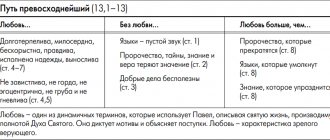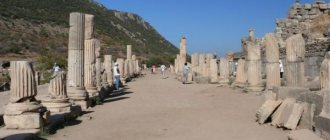Telegram channel @ieshua.org
Image from rawpixel.com
And yet, what is love? Television advertisements and Hollywood films paint a fictional picture of sexy young men and women full of euphoria and “butterflies in the stomach.” But what happens when we get old? When do we get wrinkles and diseases? Will this kind of love last? Obviously not.
We all know these exciting feelings, but they are not the same as love. Feelings don't last forever, but love is much more than a feeling. Love is the solution. Love is a sacrifice. Love is action and motivation.
Love is vital
When people grow up without love, they experience developmental problems and may even die. Recent research shows that the brains of abandoned children who are not loved or hugged develop abnormally. None of us are perfect, and none of us had perfect parents or a perfect environment. That's why none of us have experienced ideal love. And none of us knows how to love perfectly, so we need to figure out what true love is from a source that is beyond daily experience.
We are all social creatures and we all need a sense of belonging and relationships with other people. People cannot live completely alone, and therefore those who are completely isolated go crazy and develop mental problems. We are created to live in harmony and synergy with society. That is, depend on each other. This is the reason why God did not create us to be self-sufficient, but everyone has talents and abilities, different skills and talents to complement each other.
Splits and falls
It is believed that after Paul left, other preachers of the Lord came to the city. Among them were:
- Apollos, a good acquaintance of Aquilla and Priscilla, friends of Paul; they met him in Ephesus;
- perhaps the disciples of the Apostle Peter, as well as other preachers.
As often happens, out of special love for these eloquent teachers of high spiritual life, the Corinthian Christians began to overly venerate Apollos, Peter, and especially remembered the departed Paul.
The Corinthians were also greatly annoyed by the temptations of a rich city, which were so difficult to compatible with Christian asceticism. Having learned about this, Paul writes his letters to the young community.
How can we love others
Although we are not self-sufficient, we are unique. The problem is that we often use our gifts and talents selfishly, for self-advancement. It's as if life is a competition that no one wants to admit exists. Who has the better bank balance? Biggest house? Newest car? That's the winner! We are allowed to enjoy our gifts, talents and abilities, but that is secondary. The New Testament tells us that first and foremost they are to help us love others. We are to build up, bless, and serve others using these gifts and talents.
Corinthians 13 is probably the most famous chapter in the New Testament. In the previous, twelfth chapter, Paul talks about spiritual gifts, their purpose and importance. But chapter 12 ends with the statement that there is something even more important:
“...And I will show you an even more excellent way.” (1 Cor. 12:31)
And the 13th chapter is dedicated to this most excellent path - love. The problem was that in the church at Corinth there were many people with spiritual gifts, but they used them more for their own glory than for the benefit of other people. Even when they sought to have the gifts in practice, one half of the community did not speak to the other! Instead, there was gossip, judgment, pride and self-centeredness. Essentially the opposite of loving each other. This is not at all how children of God should behave. You may have amazing gifts and talents and lead a huge crowd, but at the same time you may lack love, be angry, grumpy, gossipy, impatient, arrogant and racist. Similar problems existed in the Corinthian church. These people were blessed with gifts and talents, but they didn't really love each other. Therefore, they used these blessings selfishly and narcissistically.
History of writing
A magnificent rich city, located on the main trade routes, the center of culture and education - this was Corinth, which was said to have surpassed in importance even Athens (from which it was only 78 km away).
This is how a modest-looking man who came here around 51 or 52 saw him. A native of the city of Tarsus in Cilicia, the Jew Saul had long been known as the Apostle of Christ - Paul.
Useful materials
The 18th chapter of the Apostolic Acts tells about Paul's arrival in Corinth. He came to the city from Athens, where he also preached God’s word.
By this time, his old acquaintances from Rome, Achilla and his wife Priscilla, had settled in Corinth. St. Luke, the author of “Acts,” writes that Paul remained with them “because of the same craft... for their craft was making tents” (Acts 18:3), thus, the Apostle was not a burden to his friends, providing for himself, helping they have to earn their bread.
Founding of the first community
Pavel spent 18 months in the city. Initially he preached to local Jews. But after some of them were outraged by his preaching, the Christians converted by Paul began to gather in a separate house that belonged to one of them, Justus (Acts 18:6-8).
Although St. Luke says that “many” of the Corinthians believed; historians doubt that initially there were a significant number of Christians - most likely no more than a few dozen.
Perhaps, after the attacks of the Jews, St. Paul even fell into some cowardice, for he was sent a vision that strengthened him.
The Lord Himself told him:
“Do not be afraid, but speak and do not be silent, for I am with you, and no one will harm you, for I have many people in this city” (Acts 18:9-10).
However, the numerical growth of the Christians of Corinth occurred after Paul's departure. And this was not without difficulties.
Iconography: Paul, the Apostle Dates: XV century. Early 15th century (1410s). Icon painting school or art center: Moscow school Icon painter: Andrey Rublev Origin: The rank could be included in the iconostasis of both the princely Assumption Cathedral and the neighboring Nativity Cathedral of the Savvino-Storozhevsky Monastery. Material: Wood, tempera Icon dimensions: height 160 cm, width 109 cm Half-length image of the apostle Pavla in a three-quarter turn. Inv. No. 12865. © State Tretyakov Gallery, Moscow
Let's look at the first 8 verses of chapter 13, the "love" chapter:
“If I speak in the tongues of men and of angels, but do not have love, then I am like a ringing brass or a sounding cymbal. If I have the gift of prophecy, and know all mysteries, and have all knowledge and all faith, so that I could move mountains, but do not have love, then I am nothing. And if I give away all my property and give my body to be burned, but do not have love, it does me no good. Love is patient, merciful, love does not envy, love is not arrogant, is not proud, is not rude, does not seek its own, is not irritated, does not think evil, does not rejoice in unrighteousness, but rejoices with the truth; covers all things, believes all things, hopes all things, endures all things. Love never fails, although prophecy will cease, and tongues will be silent, and knowledge will be abolished.” (1 Cor. 13:1-8)
Paul's definition of love here is based on only One way of ideal love - the Messiah Jesus. The more we come to understand the expression of God's love through the Messiah, the more we can love others. Before we can give love to others, we need to experience that love ourselves.
“If I speak in the tongues of men and of angels, but do not have love, then I am a sounding gossamer or a clanging cymbal.”
Paul uses theoretical and hyperbolic language, saying that if he could speak not only in human tongues, but also in heavenly languages, but did not have love, his impressive ability would be like a ringing brass or a sounding cymbal. In other words, impressive sounds, but without any purpose or real benefit. In Paul's time, copper gongs were used in idol worship. During the ceremonies, the priests beat a “gong”, which made an impressive sound, as if opening the way to the gods. But in reality it was nothing more than noise. These “gods” didn’t actually exist.
In the previous chapter, Paul reminds the Corinthian believers: “When you were Gentiles, you went to dumb idols.” In Roman theaters, gongs were used to create a special dramatic noise representing the wrath of the gods. But, again, after the noise - nothing.
Paul is saying here that even if you are a superstar and speak a hundred languages, if you don't have love, you are of no use to anyone. Your abilities are useless - just noise that does nothing.
“If I have the gift of prophecy, and know all mysteries, and have all knowledge and all faith, so that I could remove mountains, but do not have love, then I am nothing.”
Suppose you somehow became the smartest person on the planet, knowing everything there is to know, and winning every Nobel Prize there is... It's worth nothing in God's eyes if you don't have love. Without love, you will use your knowledge for self-promotion. But with love, you will use this knowledge to serve others. Knowledge itself does not change, motivation changes. The Corinthians thought that the more faith they had, the more important they were in God's kingdom. But there were those whose “faith” actually came from pride or even stupidity. Those who were willing to jump off a roof if their religious leader told them to do so. Or those who became voluntary martyrs, like suicide bombers who act in blind “faith.” And Paul challenges the Corinthians by arguing that without love, faith is useless. There must be harmony between faith and love.
“And if I give away all my goods and give my body to be burned, but do not have love, it does me no good.”
The phrase translated “I will give away all my goods” in Greek refers specifically to food being divided into small portions and distributed to as many people as possible. “Good deeds” like this are done out of selfishness, just to impress other people. It's like giving a penny to a bunch of homeless people just so you can take an Instagram selfie of yourself giving money to the poor. I can give away everything I have, but with selfish motives, just to feed my ego.
And this is true even when we are talking about a perfect good deed - self-sacrifice. In the 1st century, Emperor Nero forced believers to renounce their faith, to renounce the God of Israel and His Messiah, on pain of burning or crucifixion. To be ready to die for your faith, to be ready to burn at the stake - this is very noble. But even such noble acts as self-sacrifice can be motivated by pride rather than love. For example, in the same era, the Greeks, who believed in dualism, viewed physical suffering as a path to transcendence: the more you suffer, the more your soul is purified. And death? It brings ultimate freedom to the soul. Therefore, they were also not afraid to die, but from opposite, self-centered motives.
According to Paul, your noblest actions, unless done out of love, are merely self-glorifying and therefore ineffective.
“Love is patient and kind, love does not envy, love does not boast, it is not proud.”
“Love is patient”: In Hebrew, the word “patience” is associated with suffering, with the willingness to suffer. Love is the willingness to suffer for the sake of others, and patience is best demonstrated in the Messiah's suffering for our sins. Likewise, we must be ready to suffer for the sake of others, even if we do not receive a monument with our name for it.
“Love... is kind.”
Think about someone who is very rich, but keeps all their money to themselves, ostentatiously throwing it around, just to show off. On the other hand, I can think of a friend, and I'm sure you can too, who doesn't have much money, but who shares it with others, and wherever there is a need, he is ready to help. Kindness and generosity are best demonstrated in Jesus, who, being innocent, was willing to die in our place and give His life to give us the most amazing gift of all—eternal life. And so we must be generous with our resources, our time, our strength and our relationships with others.
“Love does not envy, love does not boast, it is not proud.”
Envy brings division. Bragging demands attention at the expense of others. Arrogance or pride believes that you are better and more important than others. If you read Corinthians, you will see that many were constantly jealous or proud of their accomplishments, or trying to outdo each other as if in competition. All this is the opposite of love. When Paul teaches the Corinthians what love is not, he is teaching them what they lack. This is a rebuke to the Corinthians, and, to be honest, to all of us. The value of the Kingdom is humility. Envy, arrogance and pride always go against humility. “Blessed are the poor in spirit, for theirs is the kingdom of heaven” (Matthew 5:3).
“He does not act outrageously, does not seek his own, is not irritated, does not think evil (does not remember evil - new Russian translation).”
Rude behavior makes other people feel uncomfortable, even humiliated. But love produces the opposite effect. Love seeks to honor others and cares for their well-being. Looking for your own means being first in line for food, putting more on your plate, without caring whether others have enough. Or take a seat on the bus when there is a disabled or elderly person who needs it.
When Jesus gave His life for us, He was not thinking about Himself, but about the good of others. Likewise, we must make the welfare of others our priority. Imagine for a moment what the world would be like if we all thought of each other before ourselves. “Not irritated” means that it is very difficult to anger such people. Some people get angry because of one wrong word, but love is not easily angered. Jesus, who experienced so much injustice and so many attacks from all sides, was not easily angered, but He knew how to best deal with each situation. The truth is that He was not angry with sinners, but with corrupt religious hypocrites who dishonored the Name of God.
Remembering evil means holding grudges against others. There are people who remember all your misdeeds, all your past mistakes. But love doesn't do that. Love forgives and lets go. God does not take away our sins, but through the Messiah He completely forgives us of them. “God in Christ reconciled the world to himself, not counting their trespasses against people, and gave us the word of reconciliation” (2 Cor. 5:19).
“Love... does not rejoice in untruth, but rejoices in the truth.”
Love is not happy when someone fails or when bad things happen, even to enemies. “Do not rejoice when your enemy falls, and do not let your heart be glad when he stumbles” (Prov. 24:17). Love rejoices when truth appears. When someone accepts the truth and believes in it and holds on to it. By the way, true love is not like New Age kindness, which allows everything and even capitulates to what is not the truth. True love speaks the truth, even if it is hard to hear. Like the biblical prophets, without being soft at all, Jesus also stood up to the leaders and corrupt religious hypocrites and did not stand on ceremony. In the same way, we should not rejoice when bad things happen, even to people who hate us, but we should rejoice in the truth and those who reveal the truth. Therefore, we need to know how to stand for the truth and not be humbled when we encounter some false version of “love.”
“Love... covers all things, believes all things, hopes all things, endures all things.”
“Love covers all things” means that love can overcome difficulties and remain strong in any situation, just like the Messiah agreed to take the death penalty upon Himself, even though it was supposed to be our punishment. “Love... believes everything, hopes everything, endures everything” - this means that in any situation love continues to believe. True love does not lose faith, but is able to endure even difficult situations and maintain hope. She does not look back, like Lot's wife, but continues to look forward, full of hope and faith. When Jesus faced the cross and the situation seemed completely lost, the love of God never lost faith or hope, but conquered death through the resurrection of the Messiah from the dead. In the same way, we must be brave in every storm that comes into our lives, even when we face death. “And do not be afraid of those who kill the body, but are not able to kill the soul” (Matthew 10:28).
“Love never fails, although prophecies cease, and tongues are silent, and knowledge is abolished.”
“Love never fails” means that it will never fade, never give up, and never expire. We live in a world where every product has an expiration date, but not love. Love has no expiration date. It remains valid forever. The death of the Righteous One 2000 years ago still provides redemption for many people. Your expression of love for other people has a huge butterfly effect. For example, I wouldn't be here if it weren't for the people who helped my grandmother escape from Nazi concentration camps.
Paul argues that, in contrast to the eternal nature of love, prophecy, tongues and knowledge play a temporary role that will end. When the sun is shining, there is no need for light bulbs.
Best friend forever
Let's now look at all these verses together again, but this time imagine that they apply to your relationship. Imagine that your friend, partner or family member always responds to you in this way, with love: with patience, kindness, never giving up, caring about you more than themselves, never being superior to you or making you feel inferior or stupider. He doesn’t impose his opinion on you, doesn’t irritate you and doesn’t bring up the sins of the past. Not proud, not arrogant and not vain... He is never rude or offends you. He doesn't rejoice when you suffer, he doesn't get annoyed by your individuality, but he always takes care of you, putting you first. He will never lie to you and is full of mercy when he tells you the truth. He will trust you, believe the best in you, he will be with you in difficult times, and he will take care of you when you are sick.
We all have such a friend - Jesus.
The question is, will we follow this example and become loving friends to others? And by the way, this chapter about love is relevant not only in our relationships with other people, but also in how we relate to ourselves. We also need to know how to forgive others, be patient with ourselves, believe in ourselves, let go of past mistakes and move on. Love is not only the right behavior, it is also the reasons for it. So to speak, our motivation. Our behavior is motivated either by love, or fear, or pride. The fear that we will be caught and God will punish us, just like a child who behaves well only out of fear of being punished by his parents. Pride is the hope that we will be praised, like a person giving a penny to a beggar just to show off on social media how good he is. These wrong motivations are not love.
We can be super gifted and talented, but not have love. We can even be moral and holy, but with the wrong motivation. Our moral life can either be the result of a supernatural transformation of the heart through grace, or the result of legalism that comes from pride and religious fear, as was the case with the Pharisees in the time of Jesus. The Pharisees viewed morality as a matter of outward perfection, but their hearts were rotten on the inside, full of envy, anger, greed, and pride. They may have behaved religiously and held a high position in society, but this does not mean that there was love in them.
So we have learned that while falling in love is a feeling, true love is a decision to sacrifice oneself for the sake of others, a decision that is expressed in action. And although relationships often end because the “butterflies” fly away or trouble happens, or we simply become not very attractive to each other, true love does not depend on circumstances, on appearance, bank account, nationality or gender. True love is always ready to serve others.
The most powerful manifestation of love is self-sacrifice for others.
Donating resources, time, energy and ultimately your own life. Like a mother willing to sacrifice her life to save her children, or a man for the sake of his beloved. There are many such impressive stories, but without a doubt, the most amazing of them is the story of God who revealed Himself to us in the Messiah. He lived with us, gave us everything and died for us. And now we must love others in the same way. We can sacrifice our time, our resources, our abilities, our gifts, and our strengths for the benefit of others.
“And now these three remain: faith, hope, love; but love is the greatest of these.” (1 Cor. 13:13)
Author - Eitan Bar / oneforisrael.org Translation - Anna Ivashchenko for
Donate Last: 02/28. Thank you!
Subscribe: Telegram • Facebook • • • Twitter • Instagram • Youtube
Goal of request
Both messages are imbued with concern for the converts, on the one hand, subject to unreasonable “neophyte” jealousy, on the other - Christians, surrounded by worldly temptations, often found themselves captive of passions, making spiritual mistakes that required healing. In addition, many philosophical and religious teachings widespread in Corinth also posed a temptation for the young community. Both Apostolic writings are dedicated to this.






